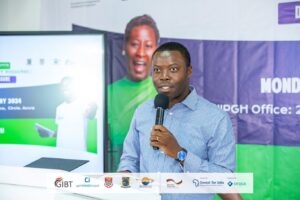Marking the end of an era, the DigiCAP.GH project, a landmark initiative led by the AFOS Foundation with support from the BMZ through Sequa gGmbH, concluded its journey with a series of final showcases like the Tech Entrepreneurs Forum (TEF) and presentations by Junior Consultants (JC). Over the past three years, DigiCAP.GH has made indelible marks in the ICT landscape of Ghana.
Collaborating closely with the University of Cape Coast (UCC) and Accra Technical University (ATU), the initiative aimed atenriching Ghana’s ICT sector has significantly contributed to bridging the skill gap, promoting employability, and nurturing entrepreneurship among the nation’s tech-savvy youth.
The concluding event at the Institute of ICT Professionals, Ghana (IIPGH) on February 26th, 2024, showcased the creativity and innovation of participants from Accra Technical University, University of Cape Coast, getINNOtized, GIZ, among others. It highlighted the talents and problem-solving skills of Junior Consultants who had undergone intensive training, summarizing the project’s achievements and insights gained.
In 2021, the Digicap initiative commenced its inaugural cohort at the University of Cape Coast (UCC). The program meticulously executed a participant selection process and conducted intensive skills training boot camps aimed at equipping individuals for the challenges ahead. Overcoming obstacles, stakeholders engaged in strategic meetings and planning sessions, which culminated in remarkable outcomes. Despite initial reservations, collaborative efforts with stakeholders drove the program’s success, leading to ongoing achievements as it approaches its closure in 2024.

David Gowu, Executive Director of IIPGH, welcomed attendees, sharing the unexpected but fruitful partnership journey with Sequa and AFOS Foundation. Despite initial doubts and a COVID-19 interruption, the project launched successfully, enhancing the institute’s visibility and impact. Gowu expressed gratitude and commitment to professional growth.

Representing Prof. Amevi Acakpovi, the Pro-VC of Accra Technical University, the Director of Business Development,highlighted the project’s fit with the university’s strategy, emphasizing student experience, research, internationalization, and community engagement. He stressed ICT’s role in innovation, aligning the project with the university’s mission for advancement.

Prof. Rosemond Boohene of the University of Cape Coast shared how her sabbatical in Germany led to the DigiCAP project, emphasizing the crucial role of ICT skills like Artificial Intelligence and Machine Learning in modern education. She noted how technologies like ChatGPT simplify tasks, underlining the technological advancement in learning.
She detailed the project’s comprehensive approach, which covers business intelligence, data science, junior consultancy, and soft skills, to foster entrepreneurship for innovation and job creation. Prof. Boohene expressed a commitment to the project’s continuity. She said, “We want to make sure that we sustain this project, even if we don’t have funding.” Her closing remarks conveyed a sense of optimism for the project’s lasting impact on Ghana’s development, stating, “This is just the beginning…Ghana will have a generation that will be able to propel it into the development that we want our country to be,” she said.
The Project Manager at AFOS Foundation, Hanna Schlingmann, highlighted DigiCAP program’s journey, focusing on overcoming challenges like internet issues through adaptation and innovation. She highlighted the importance of documentation and the project’s role in fostering networks between academia and industry, urging participants to connect with new people.
She thanked everyone for their contributions, especially noting the cross-organizational collaboration. Discussing the project’s KPIs, she acknowledged initial skepticism but was pleased with their alignment with project goals. One notable achievement was the offering of 588 students across Accra Technical University and the University of Cape Coast, exceeding the initial target of 400. Additionally, she highlighted the substantial female participation, surpassing the goal, with 162 out of the 588 students gaining employment as of 2024, of which 45 are females. She concluded by encouraging reflection on further KPI achievements and the project’s overall impact.
The DigiCAP project enhanced ICT skill development and employability through practice-oriented training in areas like data science and entrepreneurship, aiming to increase Ghanaian companies’ market competitiveness. It fostered collaboration between academia, businesses, and ICT stakeholders, offering career advancement opportunities through events like the Tech Job Fair, Industry-Academia Tech Dialogue (INDAC-TED), and the Tech Entrepreneurs Forum. These events facilitated a dynamic interface between companies seeking talent and graduates seeking job or internship opportunities.
By offering networking opportunities with industry leaders, these events aimed to empower students and graduates to secure valuable internships and job placements, thus propelling them towards a promising and gratifying professional journey. Simultaneously, companies or recruiters benefited from these platforms by identifying talents, streamlining recruitment processes, and reducing resource-intensive candidate searches.
The Digicap.gh project supported the universities in establishing and/or expanding career services that prepare students for the world of work through workshops and peer-to-peer training that offer professional development, career guidance, and personal growth. Overall, these exposure events were to bridge the gap between aspiring participants and employers, fostering a mutually beneficial relationship that bolsters the tech space.










